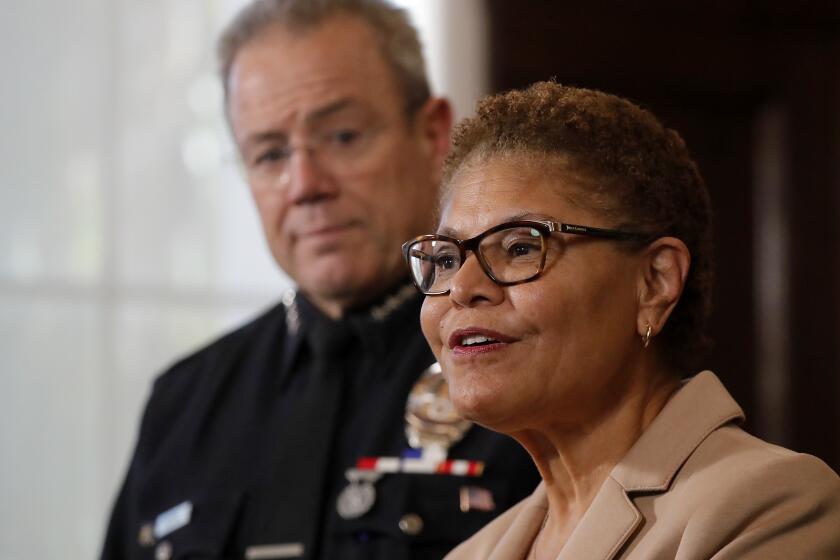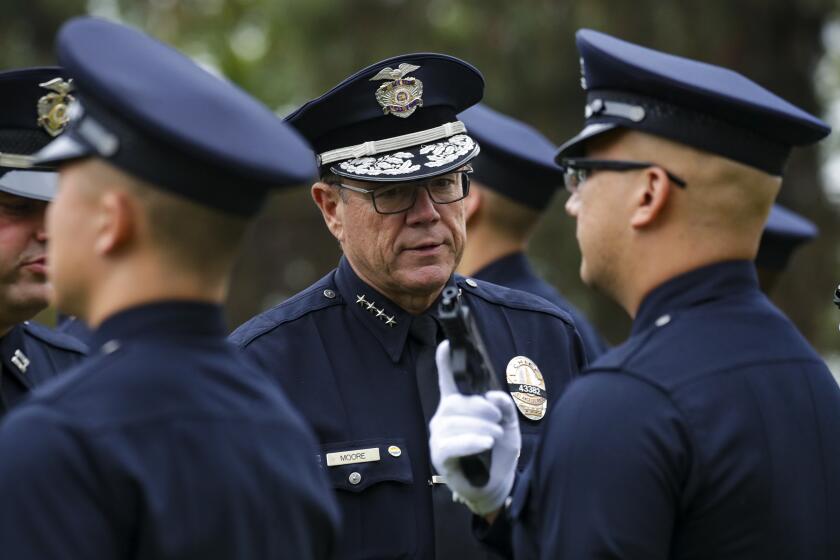Editorial: LAPD needs a chief who can turn around the department and restore public confidence

“What did I do?” Alexander Donta Mitchell asked. A Los Angeles police officer answered with a punch to Mitchell’s face.
Mitchell’s offense was to be double-parked, waiting for a friend. Instead of telling him to move, one of the officers opened the door, ordered Mitchell out, handcuffed him and hit him. It was a dispiriting example of unnecessary police escalation.
A bystander video from the July 28 incident went viral and sparked outrage, but that’s not unusual. Los Angeles residents see this kind of thing all too often. They see officers who appear to follow a set of rules unknown outside the policing world, such as throwing a “distraction strike,” which means they punch someone like Mitchell in the face to take control of a deteriorating situation. They escalate a confrontation — supposedly in order to de-escalate it.
The next LAPD chief must be someone who can spot breaking crime trends and respond quickly to quell them. The LAPD has a mixed record on this.
This leaves people who are arrested or detained by police baffled, angry and justifiably wondering, “What did I do?” Officers who believe they were following the rules may be asking the same question when they are yelled at by onlookers, scolded on the nightly news and investigated on disciplinary charges.
This kind of tension is a problem in almost every big-city police department, but it is especially widespread in Los Angeles. The LAPD is widely touted as the nation’s best-trained, best-disciplined, most storied law enforcement agency. And yet it is currently adrift, with officers resentful of their leaders and a public that is often resentful of officers. The LAPD is lacking a sense of mission. It is lacking leadership.
That’s something Mayor Karen Bass should keep in mind as she prepares to select a new police chief from a list of three candidates that the Board of Police Commissioners reportedly sent to her at the end of August.
In her first few months as mayor, it seemed as if Karen Bass were a bystander when it came to the LAPD. But her actions and comments since show that she was in charge all along and deftly putting pieces in place for a change in leadership.
Los Angeles needs a chief who is prepared to overhaul department culture and practice, re-instill a strong sense of organizational identity and reorient officers toward living up to the LAPD’s reputation as the nation’s most innovative and responsive department. And the new chief must do this in concert with the public, which needs and generally wants a department it can rely on to keep neighborhoods safe and criminals at bay. Angelenos want to know the rules of engagement, and expect officers to know those rules too.
What do amorphous notions such as leadership and identity mean? There is no agreed-upon checklist. But the new chief will be on the right track if he or she can help get officers to better respect those they are policing, meet high standards of integrity and grasp how their work fits in with other first responders such as mental health workers. The chief must also communicate to officers that their work is respected and their psychological needs are being met — because policing is harrowing work.
At present, the LAPD seems to be on no track at all. The evidence goes beyond “distraction strikes” that too often are merely expressions of anger. It goes beyond needless shootings or tasing of mentally ill or anxious people, or destruction of homes and the betrayal of those they are supposed to protect. Police in the Mission Division have been under investigation for more than a year on suspicion of what amounts to armed robbery of innocent motorists under color of law. Officers in other parts of the city have been accused of falsifying records. Racism and sexism are serious and persistent problems.
The LAPD chief said Friday afternoon that he will step down next month. This is the right move, and gives the mayor an opportunity to reshape public safety in Los Angeles
Discussion about a new LAPD chief has focused on whether the department will be ready for the 2026 World Cup and the 2028 Olympics. It has focused on whether it’s better for the chief to be an LAPD insider who knows department culture or an outsider who will bring in new ways of thinking. And it has focused on glass ceilings and identity, asking, for example, whether it’s about time for Los Angeles, with more than half its residents and its police rank-and-file being Latino, to have a Latino chief, such as former LAPD operations chief and current district attorney investigations chief Robert Arcos. Or former Houston and Miami Police Chief Art Acevedo.
Or whether in a city that just elected its first Black female mayor, and at a time when the U.S. is seriously considering whether to elect its first Black female president, it’s high time for the LAPD to have its first Black and first female chief, such as Emada Tingirides, deputy chief in command of South Bureau. All have been rumored to be on the secret short list Bass is considering, as have others.
These are not the wrong questions, but they’re also not the only ones. L.A. is in dire need of a chief who will lift the department’s standards and performance. And along with that, its officers’ spirits and the public’s confidence.
More to Read
A cure for the common opinion
Get thought-provoking perspectives with our weekly newsletter.
You may occasionally receive promotional content from the Los Angeles Times.













